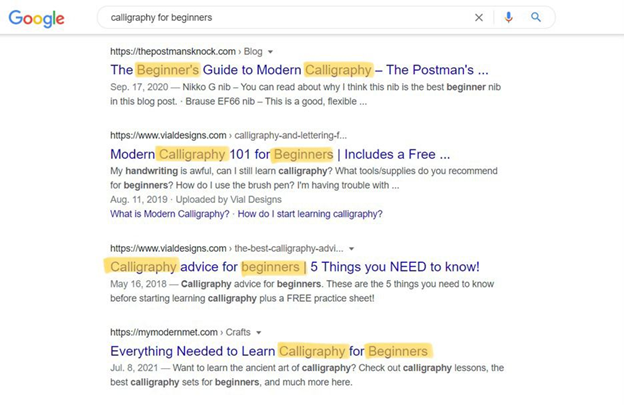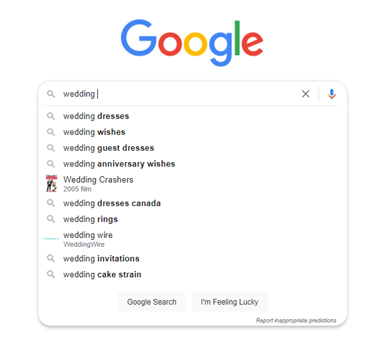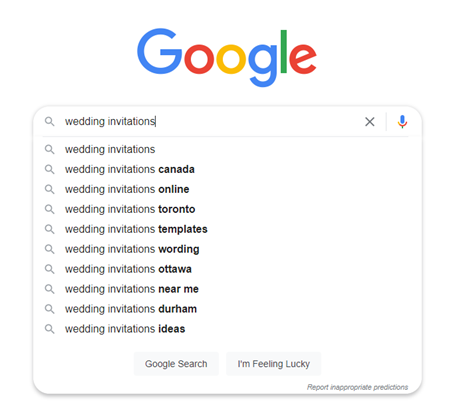What is SEO?
As mentioned in our previous blog, Search Engine Optimization (SEO) is using keywords to optimize your website and improve your ranking on Google. In simpler words, Google bots scour the internet looking for relevant keywords every time a Google search is made. They rank their findings based on what they believe the user wants to see. Still confused? Let’s use an example. If you search “Calligraphy for beginners” on Google, all the top results have the words calligraphy and beginners in the title:
Why are SEO Keywords Important?
Keywords help you rank higher on the search engine results page (SERPs) which in turn drives traffic to your website. Don’t believe us? Let’s continue with our calligraphy example. We clicked through to the first link, and we noticed the blog used:
- the word “beginner” 17 times
- the word “calligraphy” 67 times
- the word “guide” 6 times
- the phrase “beginner’s guide to modern calligraphy” 4 times
They made it to the top of the SEPRs because they knew people would search “calligraphy for beginners” or “beginner’s guide to calligraphy” and they included those keywords into their blog multiple times.
Best SEO Keyword Strategy Practices
Develop a Customer Persona
In order to understand what your target audience is searching for on Google, you need to get into their heads. Ask yourself:
- What problems are they facing? i.e., if someone has problems falling asleep, they may search “why can’t I sleep”?
- Where are they in the customer buying process?
- Are they becoming aware? i.e., “what is insomnia?”
- Are they researching and comparing options? i.e., “how do I fix my sleeping schedule?”
- Are they ready to purchase? i.e., “sleeping pills over the counter”
Once you understand what your target audience is searching for, you can start looking at what keywords they would use.
Use Google Suggest
Google Suggest is the easiest and most accessible tool for finding keywords. All you have to do is enter your topic into Google and let autocomplete tell you what people are searching for. For example, if you’re a wedding blogger, you can search “wedding” to see what content people are interested in:
What’s the issue?
All the keywords mentioned here are very competitive because of how often they are searched for. Well-established companies have already optimized them, and it can take years for you to get to the first results page. Instead of competing for these words, we suggest using long tail keywords.
Use longtail keywords
Longtail keywords are keywords that your competitors have overlooked which makes it easier for you to rank high for them. Longtail Keywords are more descriptive than normal keywords so to find them, you can just add words to your Google search. Going back to the wedding blogger example, you can search for “wedding invitations” instead.
If you believe these terms are still too competitive, you can keep adding words until you’re satisfied with your keyword.
Use Wikipedia
Wikipedia has content on almost every topic which you can use to find hundreds of subtopics to use as keywords. The key is to look for the blue links on a Wikipedia page:
If you search up “painting” on Wikipedia, you find a variety of subtopics. You may not be able to use “paint” or “pigment”, but you can write an article about “narrative art” or the “Sistine Chapel ceiling.”
Again, you can press on these blue links to find more your longtail keywords.
Narrow down your keyword list
Once you’ve composed a list of potential keywords, narrow down your list using any of the following:
Keyword Everywhere Chrome Extension
The Keyword Everywhere extension tells you about the cost per click, search volume, domain authority, backlinks etc. for every link of Google. It helps you figure out which keywords are too competitive.
MOZ SEO Toolbar Chrome Extension
MOZ SEO Toolbar has similar metrics to the keyword everywhere extension with the addition of page authority.
Google Keyword Planner
Google Keyword Planner is a part of Google AdWords that can help you find low volume and high cost per click long tail keywords.
Ahrefs
Ahrefs is a well-known SEO tool that tells you the keyword difficulty, volume, cost per click, clicks per search, return rate and global volume of any term. It also offers you unique keyword ideas that are easy to rank high for.
Asses your Competition
Another way to assess keyword difficulty is assessing your competition. Search your keyword on Google and see if you recognize the top results. Do you recognize the brand? Are they well established? If the answer is yes, it will be hard for you to outrank them.
Now that you’ve created a list of keywords, you are ready to start writing! Stay tuned for our blog on copywriting.
About GlobeSign
GlobeSign is a Canadian web solutions and digital marketing company helping clients grow their revenues online using our Digital Marketing services including Search Engine Optimization (SEO), Social Media Marketing (SMM), AdWords (i.e., PPC, CPC) and Content Writing. We keep up to date with the latest technology and trends, and we continue to provide best in class digital marketing solutions for our clients in Canada, in the US and Globally.
GlobeSign’s SEO commitment to its clients
GlobeSign has many proven projects in very competitive markets, and we remain committed to providing the results our clients need by ensuring:
- Continuous strategy changes according to the results and google updates —typically, we revisit our SEO plans after every 3 months.
- Partnership with our client where we not only work very closely with our clients, but we also monitor success together.
- GlobeSign also does the website maintenance. This allows our development team to work closely with the Search Engine Optimization team to ensure we make necessary changes to the website on a timely manner.
- Within six months, GlobeSign commits to producing the results in terms of improving keywords ranking, driving website traffic, and fulfilling our committed tasks.
- Continuous commitment towards bringing the website on first page of Google because 98% traffic comes from Google search engine. However, organic SEO takes time and consistent efforts. For the same reason, we revisit our SEO strategy from time to time and make complete analysis regarding what is working and what is not. This helps us increase our ranking and traffic ensuring we meet our keyword ranking targets.












